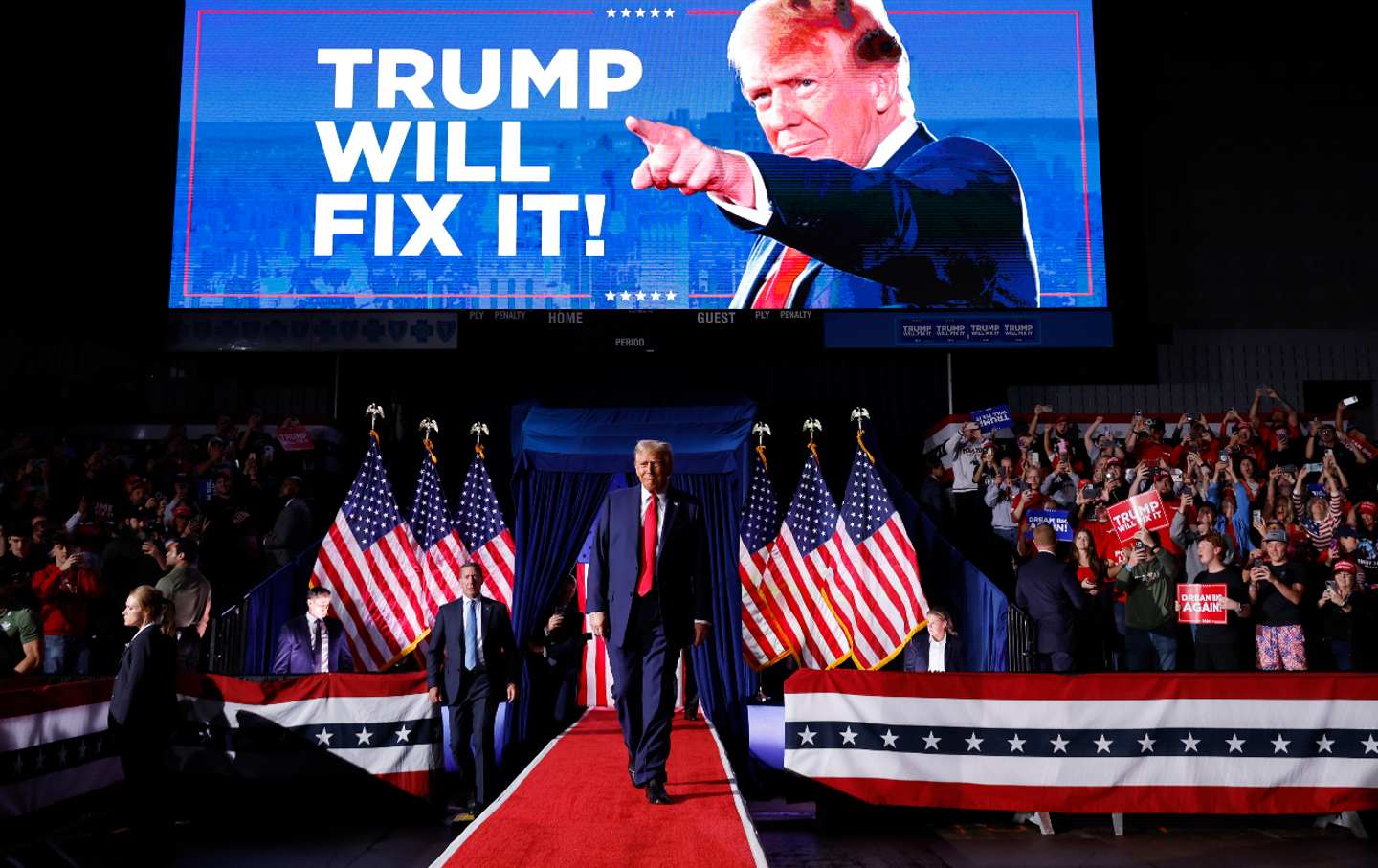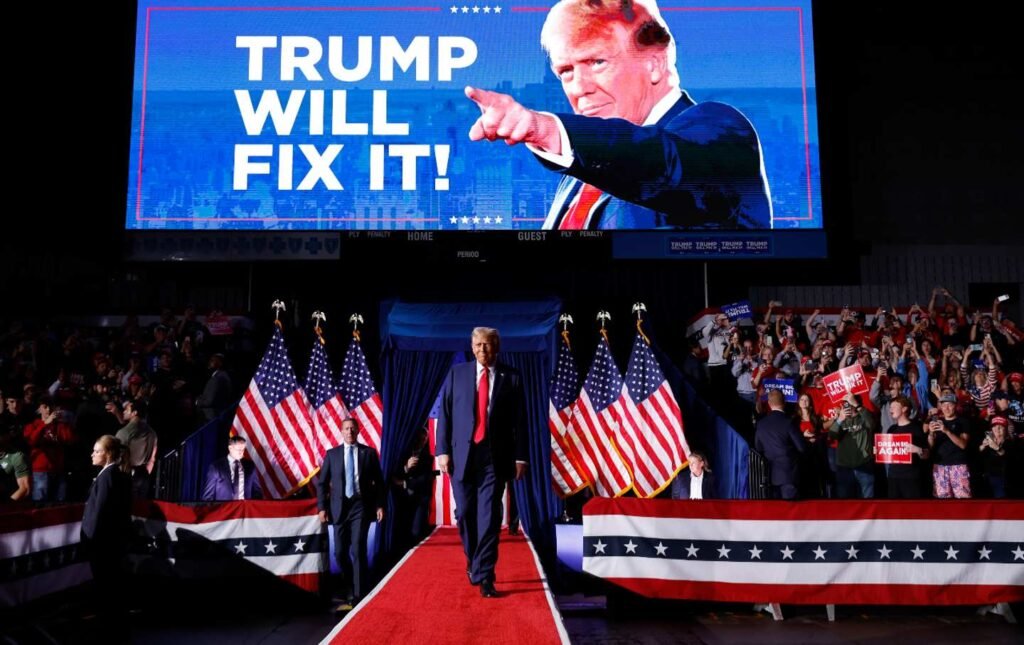This is capitalism and it is global.

There are many problems with the American political system: among them the Electoral College, an undemocratic Senate, and a right-wing Supreme Court. Then there is America’s deep-seated racism, coupled with sexism and xenophobia. But Trumpism goes beyond Trump — and beyond the borders (fenced or not) of the United States.
The phenomenon of right-wing populism is widespread and appears in far-right parties in Western Europe, in Orbán’s Hungary, Putin’s Russia, Erdogan’s Turkey, Bolsonaro’s Brazil and Modi’s India. While country-level features can help us understand individual cases where the same phenomenon repeats itself, a higher level of analysis is needed. The only thing these different countries have in common is that they are all deeply embedded in the global capitalist economy.
With the rise of capitalist globalization—starting with the Reagan/Thatcher era or even Jimmy Carter’s deregulation—national governments have become less and less able to shape outcomes that could positively impact the lives of their citizens. Capital has gone global, pushing for lower taxes, less regulation and cheaper wages. Financial markets have followed the vagaries of fluctuating interest rates and currencies around the world.
In short, the economy has become global, but politics has not. The vessel of national politics could no longer contain the forces that were central to people’s everyday lives, such as well-paid work and a decent standard of living.
Elections were held, governments came and went, but for many people there was little sense of meaningful change. As a result, trust in government institutions has plummeted around the world. But the suffering was not shared equally. Capital flows to global cities, attracting educated professionals, while other places are “left behind” to deal with “deaths of despair.” Center-left parties followed new centers of attraction to urban professionals. But they failed to protect their flank in electoral politics.
Therefore, one should not be surprised by the appeal of nationalism, the desire to “take back control” and “make our country great again.” With the exception of Meloni and Le Pen, all of these would-be autocrats are men. Their appeal can be partly explained by the relative decline in the number of (especially less educated) men in increasingly post-industrial societies. But the strongman also projects a sense of muscular protection against forces that seem out of control.
By its very nature, global capitalism is a mysterious phenomenon, without an address or figure. Conspiracies provide a coherent narrative, a sense of understanding and comprehension of the amorphous forces that shape human life. More often than not, they turn to the troubling question: who is to blame?
Strongmen give a ready answer. Still, whether they’re self-proclaimed billionaires like Trump or rely on the support of oligarchs, their plot should address a conservative dilemma: How, in societies with even a hint of democracy, do conservatives convince people to support policies that benefit the uber- rich? The strongman’s tactics are simple: strike. Blame immigrants, ethnic, religious or sexual minorities. You can blame the amorphous “elite”, but never the capitalist class.
While Elon Musk literally danced for Trump and Jeff Bezos apparently supported him Washington Post to avoid alienating the intended future president, one study found that 150 billionaire families contributed about $2 billion to influence this year’s election. They’ve already reaped a significant return on their investment: the wealth of the world’s 10 richest people — a list dominated by American tech billionaires —increased by $64 billion on the single day after Trump was elected.
Still, despite 72 percent of all billionaire funding going to Republicans, more billionaires backed Harris than Trump. What better illustration of the oligarchic takeover of our politics? Who are you voting for if you think the problem is the billionaires themselves?
There is little chance that capitalism, especially in its global form, will come to an end anytime soon. But without railings, capitalism will continue to run rampant, trampling our politics and poisoning our planet. For this to change, the world’s oligarchs must realize that unfettered capitalism is eating them up along with us.
He has the study of oligarchic rule in various societies throughout history, Geoffrey Winters found that the one common element was the primary desire to protect one’s wealth. Today’s oligarchs should be reminded that they stand at the top of human pyramids, supported by masses of people, people who carry enormous burdens on their backs and shoulders.
In short, the oligarchs of the world should fear that if enough people rise up and shake this pyramid, the fall will be long and hard. Their vast wealth could disappear, and there is nowhere – not in New Zealand or on Mars – to run and hide. The oligarchs must be shaken, brought to their senses, before it is too late for all of us.
popular
“Swipe to the bottom left to see more authors”Swipe →
We cannot retreat
We now face a second Trump presidency.
There is nothing to lose. We must use our fears, our grief, and yes, our anger to oppose the dangerous policies that Donald Trump is unleashing on our country. We rededicate ourselves to our role as principled and honest journalists and authors.
Today we are also preparing for the future struggle. It will require a fearless spirit, an informed mind, wise analysis and humane resistance. We are faced with the passage of Project 2025, a far-right Supreme Court, political authoritarianism, rising inequality and record homelessness, a looming climate crisis and conflicts abroad. Nation will expose and propose, develop investigative reporting and act together as a community to preserve hope and opportunity. NationThe work will continue — as it has in good times and bad — to develop alternative ideas and visions, deepen our mission of truth-telling and in-depth reporting, and expand solidarity in a divided nation.
Armed with 160 years of courageous independent journalism, our mandate remains the same today as it was when the Abolitionists were founded Nation— to defend the principles of democracy and freedom, to serve as a beacon in the darkest days of resistance, and to see and fight for a bright future.
The day is dark, the forces are building tenaciously, but it’s too late Nation editorial board member Toni Morrison wrote “No! This is just the time when artists go to work. No time for despair, no room for self-pity, no need for silence, no room for fear. We speak, we write, we make language. This is how civilizations heal.”
I encourage you to support Nation and donate today.
next,
Katrina Vanden Heuvel
Editorial Director and Publisher, Nation


